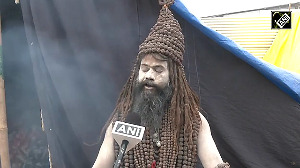Rediff.com's Vicky Nanjappa travels to Bhatkal on Karnataka's west coast to investigate how a quaint town turned into a hotspot. Bhatkal has been in the news since the Indian security agencies zeroed in on terror links to this town.
Bhatkal is considered to be one of the most communally charged towns in Karnataka and which has gained notoriety thanks to locals like Riyaz Bhatkal who is alleged to be a key member of the Indian Mujahideen.
This town, with a population of 45,000, did not witness a single skirmish during the post-Babri Masjid demolition riots which rocked the country. However, it did face some communal violence in late 1993, which is generally regarded by the locals as the beginning of communal tension in the town.
The Hindus claim that an Inter-Services-Intelligence programme in 1993 after the riots changed the face of the town, while the Muslims say certain stage-managed incidents by the Bajrang Dal changed the communal equations in Bhatkal.
Shocked by the violence, the Karnataka government set up the Justice Jagannatha Shetty Commission which squarely blamed the Muslims for the violence. But the Muslims of Bhatkal claimed the judge had been biased in his report. The Hindus on the other hand allege favouritism and blame the government for 'minority appeasement', since the report has not been tabled in the assembly till date.
In 1996, the sitting Bharatiya Janata Party MLA, Dr U Chittaranjan, was murdered and this led to communal violence for nearly spanning six months, and which claimed 17 lives and damaged property worth Rs 15 crore. Since then, the town has not been the same. The Muslim community in Bhatkal says it was the JP which has brought about the rift.
Bhatkal has two major communities, the Namdharis (toddytappers, Hindus)
There is also an interesting recording in one of the government files at Bhatkal which relates the story of how the Shabandri Navayats helped a Namdhari family to repair a chariot and the Namdhari family, out of gratitude, parades the chariot at the Shabandri's house.
Things began to change when the BJP made a entry into Bhatkal. The party asked Dr Chittaranjan to go to Bhatkal and establish the party there. He readily agreed and set up his practice in Bhatkal. The Muslims allege that he managed to change the social fabric of Bhatkal and convinced the Namdharis to join the Rashtriya Swayamsevak Sangh, which sowed the seeds of communal discord.
The RSS and Bajrang Dal in Bhatkal rubbish this claim. They claim the ISI had made inroads into Bhatkal and was influencing Muslims. A former top cop said there was an ISI programme in Bhatkal in the early 1990s and a lot had changed since then. The police had submitted a report to the government to this effect but no action had been taken on it as yet, claimed the cops.
The Muslims allege that the ISI programme was just an excuse to target the community. "The RSS used this as an excuse to put the police on to us. The Namdharis who had lived in communal harmony were all brainwashed by Dr Chittaranjan and his men, and he managed to win the 1995 elections with a thumping majority. A year later he was murdered mysteriously and the matter continues to be debated as to who was behind the murder."
The BJP on the other hand says the ISI and its elements could not bear Chittaranjan's success and had him killed.








 © 2025 Rediff.com -
© 2025 Rediff.com -